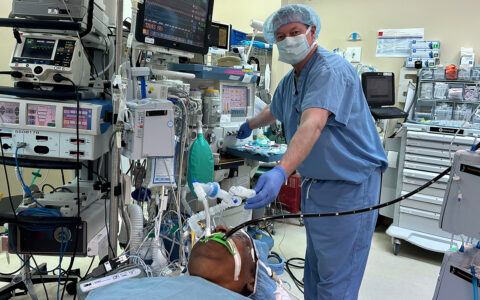Results of the EMPULSE trial challenge the lingering hesitation to initiate use of empagliflozin for patients in the acute stage of chronic heart failure. EMPULSE was a double-blinded, placebo-controlled trial of 530 adult patients conducted at 118 centers across 15 countries.
The first days that follow acute heart failure (AHF) are considered a vulnerable period. Wariness about potential adverse effects on patients have resulted in a reluctance to administer empagliflozin during that time, said Sean Collins, M.D., a professor of emergency medicine at Vanderbilt University Medical Center. Collins was part of the EMPULSE steering committee and an author on EMPULSE trial results published in Nature Medicine in March 2022.
“Now we have firm evidence that, when started in the hospital once patients are stabilized, it is safe, well-tolerated, and has clinical benefits.”
“There has been a critical unmet need to understand if early intervention with empagliflozin and other medications in this class could be safely initiated during an AHF hospitalization,” Collins said.
“But given the aggressive treatment patients receive with diuretics and other vasoactive agents, there have been concerns that SGLT2 inhibitor use might result in renal dysfunction, volume depletion and other side effects. Now we have firm evidence that, when started in the hospital once patients are stabilized, it is safe, well-tolerated, and has clinical benefits during the first 90 days after hospitalization,” he said.
Pros and Cons of Early Use
Empagliflozin is a sodium and glucose co-transporter 2 (SGLT2) inhibitor, which blocks reuptake of these substances from the kidney and into the bloodstream, thereby reducing edema and increasing urine output.
Typically, patients undergoing AHF management receive “loop diuretics,” such as furosemide (Lasix) and bumetanide, during hospitalization. These act on the loop of Henle in the kidney to cause diuresis. The SGLT2 inhibitors target a different location in the kidney, augmenting diuresis, Collins explained.
To date, SGLT2 inhibitors had been shown to lower hospitalization and mortality rates in patients with chronic heart failure, but their impact had not been studied extensively in AHF.
“In the first days of an AHF hospitalization, there is a lot of stabilization and treatment taking place,” Collins explained. “Neurohormones that affect a patient’s kidneys and heart are out of balance. We weren’t sure what impact [empagliflozin] would have on blood pressure and the kidneys if given along with the IV medications we use early on to aggressively pull fluid out of the patient.”
Seeking Overall Clinical Benefit
To find out, the researchers randomized 530 patients presenting at a study hospital with de novo or decompensated heart failure. Each received one-to-one to placebo or empagliflozin. The study group received 10 mg of empagliflozin, starting as early as 24 hours after admission through 90 days after study enrollment.
The primary outcome was overall clinical benefit. This included deaths by any cause, number of heart failure events, and time to first heart failure event. The researchers also found a five-point or greater change from baseline in the Kansas City Cardiomyopathy Questionnaire Total Symptom Score at 90 days. This questionnaire is a heart failure quality-of-life indicator.
Win Ratio Tells the Story
The study yielded a win ratio of 1.36:1, with the superior clinical outcomes favoring the empagliflozin patients. Benefits were observed for both acute de novo and acute decompensated chronic heart failure, and this held true regardless of left ventricular ejection fraction or the presence or absence of diabetes.
Empagliflozin was well-tolerated, and fewer serious adverse events were reported among empagliflozin-compared with placebo-treated patients, 32.3 percent versus 43.6 percent of the study groups, respectively. Fewer patients treated with empagliflozin were readmitted within 90 days, and fewer went to their doctor with worsening symptoms.
“These better outcomes are likely because of the underlying benefit this class of medications provide, and by giving them earlier we may have been mitigating some of the ongoing problems these patients experience related to their kidneys and heart. Early administration will also hopefully facilitate long-term medication adherence,” Collins said.
He says it was important to look at the prognosis 90 days from the time of enrollment to ensure the benefits were sustained after the AHF hospitalization. In EMPULSE, the benefits started early and continued through the 90 days.
Protocol Changes in Place
While determining the best time to start SGLT2 inhibitors has been an ongoing debate, Vanderbilt physicians are now starting these medications prior to hospital discharge. They monitor the synergistic effect of empagliflozin closely, and sometimes need to decrease loop diuretics, but Collins says that the degree of adjustment is usually not significant.
This study is one of many heart trials in which Collins has taken an active role over the past 15 years.
“This bridge between the acute environment, which is where we conduct a lot of our studies, and the chronic environment, where we know that an intervention already works, is a niche that is of significant interest to me, and has a potential to provide great benefits to patients,” he said.





